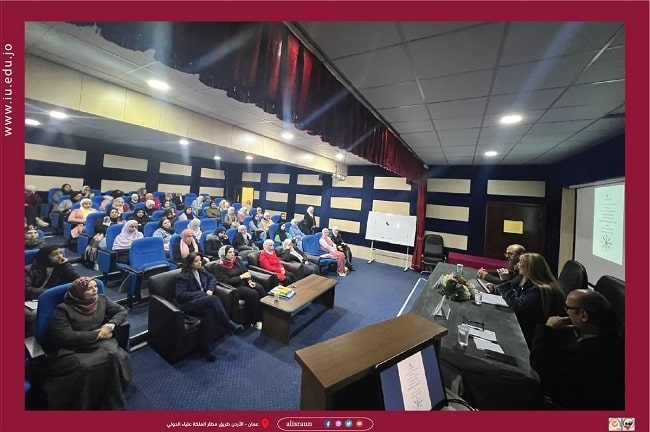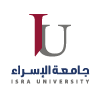
On Tuesday, January 7, 2025, the faculty of Educational Sciences at the University organized an educational lecture entitled "The Role of Children's Literature in Social Upbringing", in the presence of the Dean of the Faculty, Dr. Asmaa Al-Khalidah, faculty members, and students of the faculty of Educational Sciences.
The writer and author Sarah Taleb Al-Suhail and the journalist Mahmoud Al-Dawoud participated in the seminar, in which they discussed the importance of children's literature and its goals, the concept of children's literature, and the role of children's literature in social upbringing.
The lecture was opened by Dr. Asmaa Al-Khawaledh, Dean of the faculty of Educational Sciences, who spoke about the importance of children's literature and its role in moral education. She also spoke about the importance of holding such seminars that link the curriculum with reality from life experiences in the field of children's literature. Her speech was distinguished by encouraging reading and using children's literature in the process of socialization. Dr. Abdullah Al-Majali, a faculty member at the faculty, gave a valuable speech about the importance of proper socialization of children through the use of children's literature in education and teaching, and that the community's interest in this topic raises the value system in society.
In her lecture, writer Sarah Al-Suhail said that childhood is the foundation of the future, and taking care of it healthily, psychologically, emotionally, educationally, socially and culturally is an obligation on all societies, by providing a safe and suitable environment for their healthy cognitive, social and psychological growth and development during the various stages of social upbringing. She added that various institutions bear the responsibility of caring for children, starting with the family institution, passing through the educational, religious, cultural and media institutions, but the family institution represents the cornerstone in caring for children, especially in the early stages of life, as it is the first society in which the child lives and from which he absorbs values, knowledge and behavior.
Pointing out that today's child may not find adequate care from the family and embrace him with sufficient affection and social development necessary to control his behavior according to social, moral, educational and basic standards in shaping his awareness. She said: Rather, today's child has become prey to mobile screens with all the materials they contain that attract children, and leaving children easy prey to mobile phones and computers may be a pure choice of parents with the aim of protecting their children from any physical or health danger that may threaten them from mixing with society or peers, and therefore we may find them encouraging their children to play electronic games and achieve victory in them, ignoring the fact that they have caused serious harm to their children by isolating them from society, which may cause them behavioral deformities.
Al-Suhail stressed that children's literature contributes to nourishing the child's mind and conscience with knowledge and gaining experience; developing his tendencies and talents, in addition to providing him with values, attitudes and sound behaviors, in addition to entertaining and amusing him, introducing him to his environment and developing his linguistic and aesthetic abilities. It also instills in him a sense of belonging to the homeland and faith, and literature helps children refine their behavior and raise them on the virtues of morality.
She added that children's literature remains one of the most prominent educational means effective in forming the child's integrated personality in all mental, psychological, social and linguistic aspects. Through stories, songs or plays that show the value of friendship, the love of the righteous, the kindness of the grandmother, and the importance of getting close to others, literature thus gains the child social interaction that nourishes his personal experiences and enhances his confidence in himself and in the society to which he belongs.
For his part, the writer Mahmoud Al-Dawoud focused in his lecture on several matters that were summarized in the definition of children’s literature, who is the child and the years of childhood. He pointed out how to form the child’s culture, and the impact of the qualitative and major shift in the world of satellite channels and social networking sites on children’s lives and its reflection on the child’s behavior.
Al-Dawoud talked about the types of children's literature, reviewing a number of Jordanian institutions concerned with children's literature, such as public libraries and the importance of the school library. He threw the ball into the court of experts and educators to know and diagnose the impact of modern scientific methods on children's culture, pointing to the role of religion, customs and social values in educating and raising children, reviewing what is required to develop children's culture and the role of society in this culture.
Al-Dawoud called on the media to pay more attention to children's literature and culture, and to invest all means to enhance this aspect.
At the end of the lecture, the Dean of the Faculty of Educational Sciences, Dr. Asmaa Al-Khawaldeh, honored the writer and author Sarah Taleb Al-Suhail and the journalist Mahmoud Al-Dawoud.


